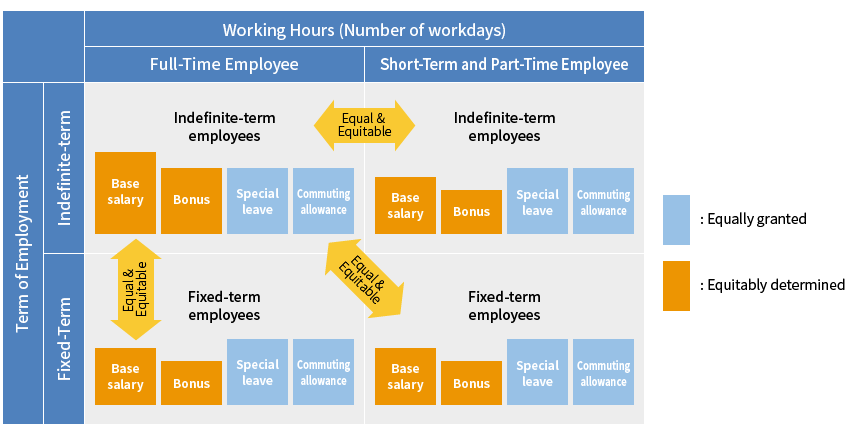Worker Dispatching Act / Social Security System
Equal pay for equal work for temporary workers
For the purpose of ensuring equal pay for equal work between so-called "regular workers" (permanent and full-time employees) and fixed-term employees, part-time workers, and temporary agency workers, amendment of the Fixed-term Part-Time Employment Act of Japan became effective since April 1, 2020.
"Ensuring Fair Treatment of Workers Irrespective of their Employment Types" (by the Ministry of Health, Labor and Welfare) (Revision of the Part-time Employment Act, Labor Contract Act and the Worker Dispatching Act)
Revised Labor Contract and Part-Time Employment Acts
- - Japan's "equal pay for equal work" is a principle that rejects any unreasonable differences in the treatment (e.g., wages, allowances, benefits, education) between indefinite/full-time employees and fixed-time/part-time/temporary employees.
- - Commuting allowance, overtime allowance, special leave for weddings and funerals, the company's cafeteria, and employee lounge are equally available to all those working for the company.
- - Base salaries, bonuses, and pay raises are determined equitably according to the employees' skills and performance.

Japan's Worker Dispatching Act was revised as follows from April 1, 2020 with regard to equal pay for equal work for temporary agency workers.
Revised Worker Dispatching Act
To ensure "equal pay for equal work" for temporary agency workers, the agency must choose to follow either the "system for equality and equitability enforced by the client company" or "system according to the staffing agency's labor-management agreement."
- -System for equality and equitability enforced by the client company (Principle)
-
A temporary agency worker receives the same treatment as the client company's employees who do the same work receive.
* The client company needs to provide information about the treatment (It will be compulsory by law.). - -System according to the agency's labor-management agreement (Exception)
-
The treatment may be determined if the agency's labor-management agreement meets the following 3 requirements:
- (1) The wage level is equal to or higher than that for other workers doing the same type of work.
- (2) A temporary agency worker's skills and abilities are properly evaluated and reflected in his/her wages to help with his/her career development.
- (3) The treatment that a temporary agency worker receives other than wages is not unreasonable compared to that given to the agency's permanent employees.

